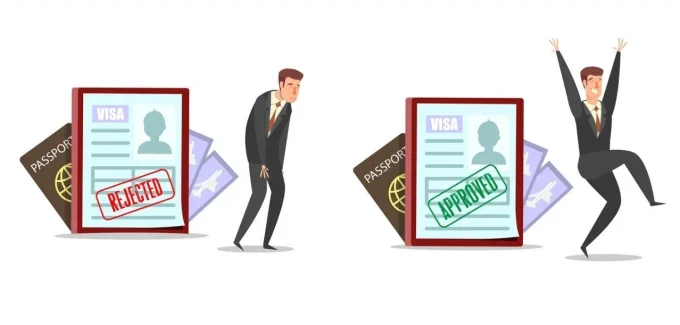Introduction
Having your U.S. visa application denied can be frustrating and disheartening, especially if you had plans for travel, work, or study. However, a visa denial does not mean the end of your journey. Understanding the reasons for your denial and knowing the next steps can help you improve your chances if you decide to reapply.
In this guide, we’ll walk you through the common reasons for visa denials, what you should do next, and how to strengthen your application.
1. Understand the Reason for Your Denial
When a U.S. visa is denied, the consular officer will provide a reason based on a specific section of the Immigration and Nationality Act (INA). The most common reasons include:
- INA Section 214(b) – Lack of Strong Ties to Home Country
- This is the most frequent reason for tourist and student visa denials. You must prove you have strong ties (job, family, assets) that will ensure your return home.
- INA Section 221(g) – Incomplete or Insufficient Documentation
- Your application is missing key documents or needs further administrative processing. In some cases, you may be given a chance to submit additional paperwork.
- INA Section 212(a) – Ineligibility Due to Criminal, Health, or Security Concerns
- This applies if the applicant has a criminal record, previous immigration violations, or security-related concerns. Some ineligibilities may be overcome with a waiver.
Tip: The consular officer should give you a written explanation of the reason for denial. Carefully review it before deciding your next steps.
2. Determine If You Can Reapply
Not all visa denials are permanent. Depending on the reason, you may be eligible to reapply after addressing the issues that led to the refusal.
Should You Reapply Immediately?
- If denied under 214(b): You can reapply, but only if your circumstances have changed. Simply reapplying with the same documents will likely lead to another denial.
- If denied under 221(g): You may only need to submit additional documents to complete processing. Follow the instructions provided by the embassy.
- If denied under 212(a): You may need a waiver of ineligibility before reapplying. Consult an immigration attorney if needed.
Tip: There is no official waiting period for reapplying, but submitting the same application without changes is unlikely to succeed.
3. Gather Stronger Supporting Documents
A well-prepared application with strong evidence can significantly improve your chances of approval. Here’s how to strengthen your case:
For Tourist or Student Visas (B-1/B-2, F-1, J-1):
✅ Prove Strong Ties to Your Home Country
- Provide evidence of a stable job, property ownership, business, or family responsibilities.
- Show proof of previous international travel and returns.
✅ Provide a Clear Travel Purpose
- Have a well-documented itinerary and proof of accommodation.
- If visiting family, include an invitation letter with their immigration status.
✅ Show Sufficient Financial Stability
- Provide recent bank statements, income tax returns, and proof of financial sponsorship if applicable.
For Work Visas (H-1B, L-1, O-1):
✅ Demonstrate Qualifications and Employer Sponsorship
- Ensure your employer submits a complete and properly documented petition (Form I-129).
- Provide evidence of your skills, degrees, and work experience.
✅ Address Any Previous Immigration Issues
- If you previously overstayed a visa, be honest and provide documentation explaining your circumstances.
Tip: Double-check all documents before reapplying to avoid minor errors that could lead to another rejection.
4. Seek Legal or Professional Assistance
If your visa was denied due to complex reasons or previous immigration violations, consider consulting an immigration attorney or visa expert. They can help you:
- Assess whether you qualify for a waiver.
- Strengthen your application with the right supporting documents.
- Prepare for a more convincing visa interview.
Tip: Some visa denial cases may require a Motion to Reconsider if there was an error in the decision. An attorney can guide you through this process.
5. Be Honest and Confident in Your Next Interview
If you decide to reapply, your next visa interview is crucial. Here’s how to improve your chances:
✅ Be truthful – Consular officers cross-check information, so any dishonesty can lead to a permanent ban.
✅ Stay calm and confident – Avoid sounding nervous or rehearsed.
✅ Answer directly – Keep responses short and relevant to the question.
Tip: If your previous denial was under 214(b), be ready to clearly explain how your circumstances have changed since the last application.
Conclusion
A visa denial is not the end of your U.S. travel or immigration plans. By understanding the reasons for your rejection, gathering stronger evidence, and preparing thoroughly for a reapplication, you can improve your chances of success.
If you’re unsure about the next steps, seeking professional guidance can help ensure you submit a stronger application the next time around.

